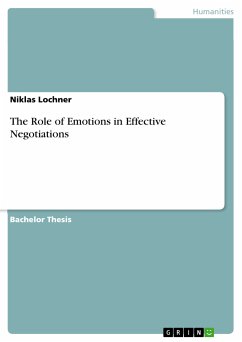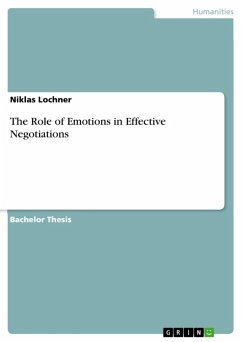Bachelor Thesis from the year 2016 in the subject Psychology - Work, Business, Organisation, grade: 1,0, University of Applied Sciences Aschaffenburg, language: English, abstract: Whether people are bargaining for the price of a flower at the florist's around the corner, a teenager is negotiating about the time he has to be home at night or the German Bayer AG is negotiating a $66bn takeover deal with Monsanto, negotiations happen every day for different reasons. Even though we are negotiating every day, there is still a misunderstanding about negotiations that often jeopardizes the outcome of the negotiation. Most people think that negotiating is a sequence of rational decision processes whereas, as a matter of fact, negotiating involves a dimension that is most often underestimated or ignored: emotions. These might be positive emotions like happiness or negative emotions like disappointment and guilt, but what they all have in common is that they significantly impact negotiations. This lack of awareness about the influence of emotions on negotiations often leads to negotiation strategies that ignore emotions, even though, recognizing and using emotions can significantly improve the negotiation experience and results. Based on the assumption that emotions do influence negotiations, this thesis focuses on the question how different emotions influence the negotiation and which skills and knowledge are necessary in order to improve negotiations through emotional intelligence.
Bitte wählen Sie Ihr Anliegen aus.
Rechnungen
Retourenschein anfordern
Bestellstatus
Storno









